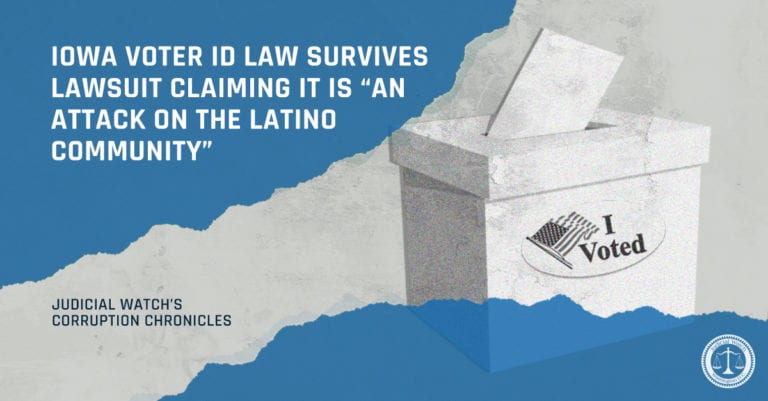

Iowa Voter ID Law Survives Lawsuit Claiming It Is “An Attack On The Latino Community”


In a much-needed victory for election integrity a judge has upheld Iowa’s voter identification law, rejecting claims by a leftist open borders group that the measure is unconstitutional because it makes it harder for minorities to cast ballots. When the group, League of United Latin American Citizens (LULAC), filed the lawsuit, the head of its Iowa chapter referred to the state’s voter ID law as “an attack on the Latino community” that places many restrictions on the right to vote. He also said the measure, passed in 2017, is a form of “voter suppression.”
Under the law Iowans must present a valid form of identification before voting in elections. Acceptable IDs include a driver’s license, non-operator’s license, passport, military ID, veteran’s ID or state-issued voter card. Voter ID laws are created to prevent election fraud and 35 states have enacted them, according to the National Conference of State Legislatures. The U.S. Supreme Court has already ruled on the issue. In 2008 the high court upheld Indiana’s Voter ID law, ruling that the state’s interest in protecting the integrity of the voting process outweighed the insufficiently proven burdens the law may impose on voters. “There is no question about the legitimacy or importance of the State’s interest in counting only the votes of eligible voters,” the nation’s highest court wrote in its decision. Even the famously liberal 9th Circuit Court of Appeals has ruled in favor of voter ID laws. In a decision involving Arizona’s measure, the federal appellate court found that the “photo identification requirement is not an invidious restriction” and does not violate the 14th Amendment’s equal protection clause.
Yet states continue to spend a fortune defending their voter ID measures in court, mostly against leftwing groups that assert they discriminate against minorities and the poor. LULAC filed its Iowa lawsuit in 2018 and the case went to trial this year, around the end of June. The Latino civil rights group claimed the law makes it harder for certain citizens—especially minorities—in Iowa to vote and that it violates sections of the state Constitution that guarantee the right to vote, due process, equal treatment under the law and freedom of speech. The defendant is Iowa’s Secretary of State, Paul Pate. The Polk County District Judge, Joseph Seidlin, who presided over the case wrote in his decision that “for the vast majority of eligible voters in Iowa, the voter identification requirement poses no real burden. They either present a driver’s license or nonoperator’s identification card which they already have, or a voter ID card which they either have or can easily obtain for free.” Seidlin also found that the evidence presented in his courtroom failed to demonstrate what LULAC alleged; that the burden on young, old, female, minority and poor voters to show an approved form of identification at the polls is greater than the rest of the population.
Pate, Iowa’s Secretary of State, applauded the court for upholding the principles of Voter ID and election integrity. “My goal has always been to make it easy to vote, but hard to cheat,” Pate said in a statement following the ruling. “Iowans have overwhelmingly voiced their support for Voter ID and this law ensures voters will be asked to provide identification before casting their ballot.” The left won’t let it rest, however. Another influential liberal group, American Civil Liberties Union (ACLU), which was not a party in the lawsuit, insists Iowa’s voter ID law is discriminatory. “Voter ID disproportionately disenfranchises Black Iowans, Latinos, and others,” according to the ACLU. “Nationally, one in four qualified Black voters do not have government-issued photo ID, and rates of Black Iowans without Iowa driver’s licenses in some counties, like Black Hawk, exceed even those numbers.”
As part of a years-long effort, Judicial Watch has taken action to support voter ID laws and has filed court briefs on behalf of states defending the measures against lawsuits. In 2017 Judicial Watch filed a brief with the U.S. Supreme Court in support of North Carolina’s voter ID and other election integrity laws. The Obama Justice Department and leftist groups alleged the law was racially discriminatory against black voters in violation of the Fourteenth Amendment and Section 2 of the federal Voting Rights Act. Last year Judicial Watch filed a brief in the United States Court of Appeals for the Eleventh Circuit urging it to sustain a district court decision rejecting a lawsuit challenging Alabama’s voter ID law. Judicial Watch has also successfully sued states—including California, Maryland and Kentucky—to force them to clean up their voter rolls.














